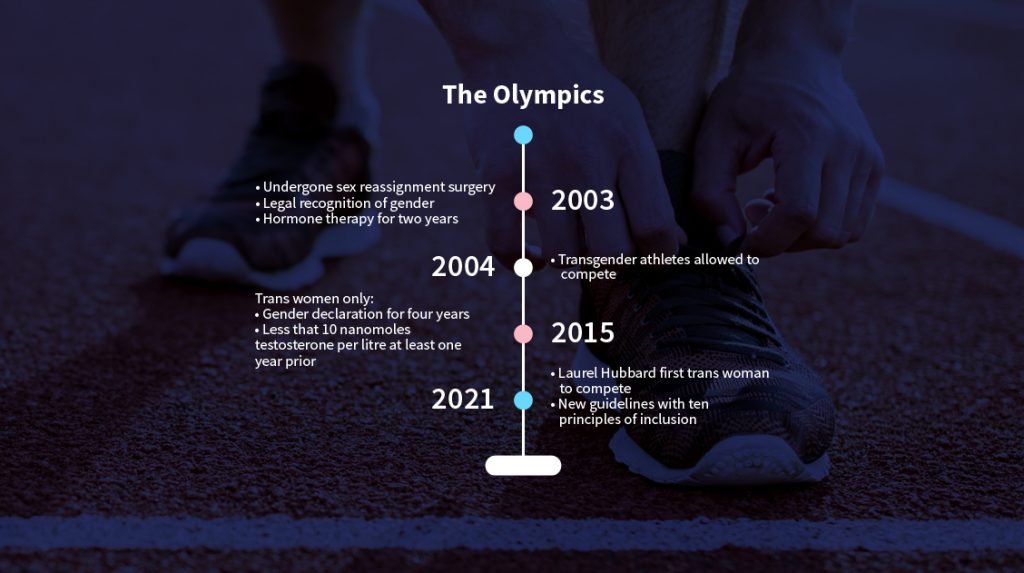
Transgender Participation in Sport
As part of our coverage of Pride Month 2022, we’re highlighting the MDPI research that has had a positive impact on LGBTQ+ lives. We’ve already covered healthcare disparities, and now we’re focusing on transgender participation in sport.
Transgender, the ‘T’ in LGBTQ+, refers to people whose gender identity does not match their assigned birth sex.
Transgender people who take part in sports face immense difficulties. This is because sports leagues have traditionally been separated according to gender. There is therefore a big question mark over transgender and non-binary players, as they don’t fit into the traditional gender norms found in the sports world.
Some people criticise the idea of transgender participation in sport. They often focus on the biological differences between individuals who have undergone male puberty and those who have not. The body changes with the testosterone released during this time. Muscle mass increases, making the body physically stronger. There is an argument that this creates an unfair advantage for transgender women who have already undergone male puberty by the time of their transition.
Others argue that transgender women do not have the competitive advantage that many claim. They often cite past female transgender athletes who have finished either among the middle places or last.
In Schools
As outlined in a study in Sustainability, the transgender community are at a higher risk of cardiovascular disease, making sports and exercise, which help prevent many different diseases, even more important for this group. The study also finds that barriers for transgender involvement in sport may include general body dissatisfaction and fear of discrimination and negative reactions. This puts transgender people off playing sports, as they hide away from the opinions of others.
Furthermore, a study published in January in Sexes profiled a group of sports players in Germany. The findings were that a substantial proportion of club members “express negative attitudes towards homosexual and transsexual people and that such attitudes correlate with other forms of stigmatization and misanthropy”.
This starts as early as school. As this paper points out, in the USA in 2020, “legislators in twenty American states introduced proposals to ban transgender (or ‘trans’) girls from competing on girl’s high school (and, in some cases, also women’s college) sports teams”.
In Big Leagues
The first transgender athlete was Renée Richards, who played in the 1970s. Richards, a female transgender tennis player, was the subject of widespread backlash when she changed from the men’s to the women’s team. This led to the introduction of the Barr body test, which determined a person’s chromosomes. However, the New York Supreme Court objected to the use of this test in determining a person’s sex, ruling Richards female. This led to major changes in tennis.
This was followed by a series of changes to guidelines in different areas, exemplified by the Olympics.

The Legality of Transgender Participation
Laws covered this issue from an American legal perspective. The authors showed how the focus of action to ban transgender athletes was on male-to-female transgender athletes. They also explain that athletes’ bodies have been “a long-time topic of fascination for policy makers charged with advancing equity in girl’s and women’s sports”.
The paper also explains that between 2020 and 2021, ten bills have passed in the USA to ban transgender athletes on female teams.
Andria Bianchi, in Philosophies, suggests the division of sportspeople into categories tied to sporting ability, such as height and weight. This is because, she concludes, there is no conclusive evidence to support any unfair advantages that transgender women have.
Transgender participation in sport is an important issue for the LGBTQ+ community, and we’re proud to cover it for Pride Month. The research in this field has the power to influence current narratives and provide clearer guidance for this complicated and controversial issue. It can also change laws to benefit the transgender community and create a fairer environment for all.











It’s a big debate about whether or not transgender women should be allowed to participate in women’s sports. It’s about how to balance inclusivity, equity, and making sure everyone has a fair shot. There’s a lot of different views on this, but I can give you some of the arguments and evidence that come out of both sides of the argument.
Supporters of transgender women participating in women’s sports often argue:
Transgender women claim that they are women and should be treated equally to cisgender women in terms of rights and opportunities, including participating in sports. Advocates stress the importance of “inclusivity” and equal opportunities for all people, regardless of gender identity. Many sports organizations, including the IOC and the NCAA, have guidelines and policies in place to ensure the equitable inclusion of transgender athletes in sports. These guidelines typically include hormone-related criteria (e.g., specific hormone levels or minimum duration of hormone therapy) to address competitive advantages concerns. According to some studies, transgender women typically experience a loss of muscle mass, strength and aerobic capacity after hormone therapy, bringing them into line with cisgender women. These findings support the argument that the benefits gained through hormone therapy outweigh any potential competitive discrepancies.
On the other hand, opponents of transgender women competing in women’s sports often raise the following points:
Critics argue that individuals assigned male at birth may have inherent physiological advantages, such as higher bone density, greater muscle mass, and lung capacity. They assert that even with hormone therapy, transgender women may retain some of these advantages, potentially giving them a competitive edge over cisgender women.
Some argue that allowing transgender women to compete in women’s sports might pose safety risks, particularly in contact sports. Concerns are raised about potential physical differences that could increase the risk of injury to cisgender women. Opponents contend that if transgender women are allowed to participate in women’s sports, it could affect the fairness and integrity of competition. They argue that women’s sports were established to provide a separate category for individuals with certain physical characteristics and that allowing transgender women to compete might undermine that intention.
While some discussions have focused on the creation of “gender-neutral” or “gender-specific” categories for transgender women athletes, this approach acknowledges the unique issues and considerations associated with transgender inclusion in sports. This approach seeks to ensure fair competition while allowing transgender women to participate in sports. It is important to note that the development of any policy or guidelines should involve consultation with health professionals, sports experts, and transgender community members to ensure that the policy is fair, equitable, respectful, and in line with current scientific knowledge. The objective should be to balance the rights of both biological women and transgender women with the need to ensure equitable competition for all athletes participating in the sport. This is an important issue for women’s rights, however, it is not a discussion about men’s rights. While transgender men are still permitted to participate in women’s sports due to their sex assigned at birth, how many transgender women are actively competing against men? To ensure fairness, this should also apply to men’s sports and there may be a different perspective on the issue.